C Raja Mohan, Strategic Affairs Editor with the Indian Express, in a three-part series analyses the unfolding geopolitical change in the Indian Ocean and details the challenges that it poses for India's foreign and security policies.
Part I: A new power equation is arising in Indian Ocean
Part II: China has responded faster than India on water
In the concluding part, Mohan says that India needs a new maritime strategy and diplomacy that are at odds with many of its past normative and ideological preferences
Providing security
From the late 18th century to the mid 20th, it was British power radiating, first out of Calcutta and then Delhi that kept peace in the Indian Ocean.
It was commonplace then to call the Indian Ocean a British lake. Although Britain was the sole super power then, it could not have exercised hegemony without the extraordinary resources of an undivided Subcontinent and its geographical location at the heart of the Indian Ocean.
In the decades after independence, India abandoned this tradition and adopted military isolationism, as it turned inward economically and coped with the pressures for territorial defence. ...
Others see Delhi as a 'net security provider in the Indian Ocean'
Despite the division of the Subcontinent, India did retain a measure of the past legacy in terms of its ability to contribute troops to international peacekeeping under the auspices of the United Nations.
While India's territorial conflicts with its neighbours have not disappeared, the nuclearization of the Subcontinent has muted them into very different tensions, especially at the sub-conventional level.
As India's economic power and military prowess grow, it is but natural that other powers have begun to see Delhi as a "net security provider in the Indian Ocean".
But is the Indian political and bureaucratic leadership capable of internalizing the notion of India becoming a security provider? The Indian Naval Headquarters has begun to emphasize the importance of assisting the weaker states of the Indian Ocean littoral in building their own capacities.
As a result we have seen the Navy provide training, advisers, and equipment to some of the smaller countries in the Indian Ocean.
Delhi slept while Chinese heard Colombo's call
Whether it was helping Mauritius operate a Coast Guard, strengthening Sri Lanka's ability to control its waters, or improving the ability of Mozambique, Madagascar and Maldives to monitor their maritime domain, India has taken a number of steps.
This somewhat ad hoc policy has included the recent transfer of ships to Seychelles, Maldives and Mauritius. To realize its true potential as a security provider in the Indian Ocean, Delhi needs to develop a comprehensive programme for security assistance.
This involves the development of a range of policy instruments including transfer of arms, financial resources and production capacities to match the growing demand for military cooperation with India, and devising frameworks for intelligence sharing, and stationing of Indian military personnel in significant numbers.
This, in turn, calls for the national security apex to bring synergy and coordination to the activities of the Navy, the Ministry of Defence and the Foreign Office. Delhi's failure to respond to the demands for maritime cooperation will result in our neighbours and friends turning some to one else.
We saw that happen in Sri Lanka. When Delhi slept over Colombo's invitation to build a new port at Hambantota, China stepped in.
Time has come to fill the 'power vacuum'
That brings us back to the notion of a 'power vacuum' that we used to reject so vehemently. While we have begun to recognise its meaning now, Delhi is still some distance away from fully internalizing its implications for our national security.
Protecting the Commons
After it escorted the 1000th ship to safety from pirates in the Gulf of Aden last month, the Indian Navy reaffirmed its commitment to secure the maritime commons in the Indian Ocean in cooperation with other major naval powers.
The 'global commons' refers to various realms -- like oceans, air, outer space and cyberspace -- that are not under the control of any one state but are critical for the functioning of contemporary international life.
The commons are a consequence of technological evolution and form the connective tissues of our globalised world.
The dominant powers of each age had undertaken the responsibility to keep the maritime commons open for use by all and contribute to the maintenance of good order at sea.
India must venture into open seas
The new emphasis on the protection of the commons underlines two important evolutions in India's maritime thinking. One is that as a rising naval power, India is taking a much broader view of its responsibility than the mere pursuit of its narrowly defined national interests.
Contributing to the public goods -- such as keeping the sea lines of communication open -- has become one of the stated objectives of the Indian Navy.
The other is the shift away from the territorial approach to the maritime commons that India had taken in the past.
When the UN Convention on the Law of the Sea was being drafted in the 1970s, India sided with those seeking to extend the territorial jurisdiction of the coastal states.
India, like many other developing states sought to restrict the rights of great powers to conduct naval operations near their waters. Today as a maritime power in the making, India needs open seas rather than waters that are enclosed in the name of national sovereignty.
India's maritime strategy stands in contrast with the Chinese
Given the rapid expansion of our security perimeter and the need to protect our vital interests far from the national shores, we can ill afford constraints on the mobility of our naval forces in the maritime commons.
No wonder the 2007 maritime military strategy of the Indian Navy is now titled 'Freedom to Use the Seas'. Spoken in the true tradition of maritime powers!
India's new non-territorial conception of the seas stands in contrast to the maritime philosophy of China.
Beijing is not only asserting its expansive territorial claims in South China Sea, but has declared that these waters that connect the Indian Ocean to the Pacific form a 'core national interest' of China.
The PLA Navy is also focused on developing anti-access and area-denial strategies that could constrain the operations of the United States and other maritime powers like India.
Why India, China will need the freedom to use the seas
One would presume at some point in the future, Chinese naval strategists would come to appreciate, much like India, the importance of keeping the maritime commons open.
For both China and India will need the freedom to use the seas to sustain their rapidly globalizing economies.
Between the 'regional' and the 'extra-regional'
One enduring feature of Indian maritime thinking has been the opposition to the presence of extra-regional powers in the Indian Ocean. In the Indian debate that followed the announcement of the East of Suez policy by Great Britain in 1967, the Indian strategic community rallied around Sri Lanka's proposal for making the Indian Ocean as a Zone of Peace (IOZP).
Arguing that the great power naval presence in the Indian Ocean will exacerbate regional insecurity, Delhi opposed the entry of the United States and Russia into the Indian Ocean after the British withdrawal.
India's chattering classes believed in the moral superiority of their position in favour of a collective security mechanism in the Indian Ocean. Yet, India's campaign for an IOZP was seen by some as part of the Soviet propaganda against the West and an attempt to limit the naval options of the United States.
India's neighbours misread the plot
Meanwhile within the littoral states, many of whom were dependent on either the United States or the Soviet Union had little commitment to the notion of collective security.
India's own neighbours, including Pakistan projected India's support to the IOZP and demand for the withdrawal of 'extra-regional navies' as a thinly disguised plot to make the Indian Ocean "India's Ocean".
India's lack of realism was unsustainable after the end of the Cold War two decades ago.
Along with its economic reforms, India began to engage all great powers, including the United States, which had a presence in the Indian Ocean. Yet when India took the initiative for convening the Indian Ocean Naval Symposium in 2008, it insisted that the membership must be limited to 'regional' states of the littoral.
India's support for the IOZP in the 1970s was probably rooted in the fear about the United States (recall 1971 and the Enterprise incident!) and opposition to Washington's alliances with China and Pakistan.
India must deal with the reality of US, Chinese presence in Indian Ocean
India's rejection of 'extra-regional' powers in the current phase appears to be a reflection of Delhi's concerns about the new Chinese profile in the Indian Ocean. As a rising maritime power, India must now begin to move away from the unproductive divide it has set up between the 'regional' and the 'extra-regional'.
For one, India itself has often becomes a target of these artificial divisions. For example in the Malacca Straits, the theme of 'regional versus extra-regional' is playing itself out often to the disadvantage to India.
Nor would India want to be treated as an extra-regional power in the Western Pacific where it has significant interests. While the very definition of a region means drawing the line somewhere, it is reasonable to suggest that no regional mechanism will work if it is seen as keeping out an interested great power.
From a practical perspective, then, India cannot either wish away the extra-regional presence of the United States or prevent the significant rise in Chinese naval presence in the Indian Ocean.
Instead of proclaiming a Monroe Doctrine that it can't enforce, India must find a way to deal with the reality of American and Chinese interests and presence in the Indian Ocean.
Indian and Pacific Oceans are beckoning us
When we talked of self-reliance, rejected trade as a strategy, and disconnected ourselves from our neighbours in Asia and the Indian Ocean, there was little scope room for a serious maritime strategy. All that has changed in the last two decades.
As we become a trading nation -- our international commerce will soon be close to half a trillion US dollars -- the Indian and Pacific Oceans are beckoning us as never before. Emerging as a major power with widely dispersed interests, India needs a new maritime strategy and diplomacy that are at odds with many of its past normative and ideological preferences.
The good news is that the Indian Navy, which was quick to grasp the military significance of India's economic globalization, has begun to adapt. The challenge for the rest of us, within the government and beyond, is in generating the bureaucratic and institutional innovation so necessary for the realisation of India's new maritime destiny.

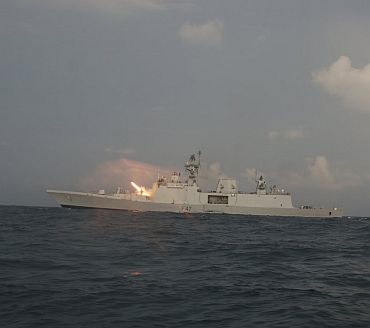

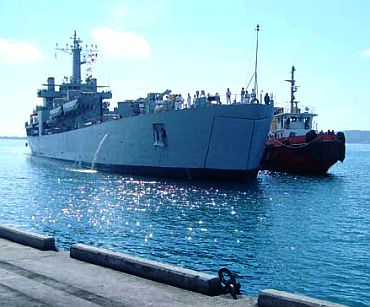
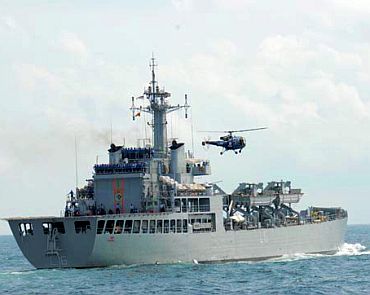
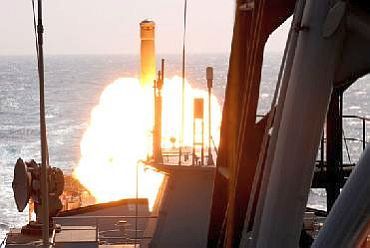
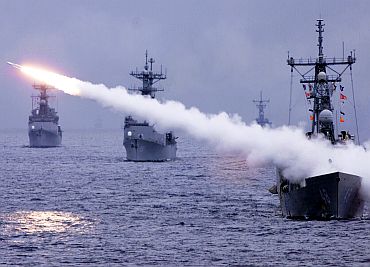
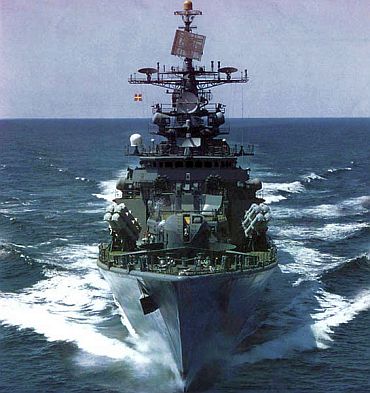
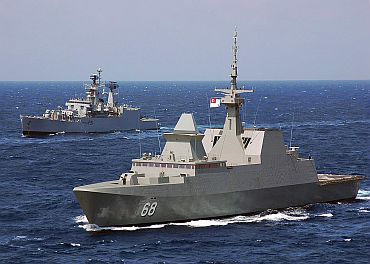
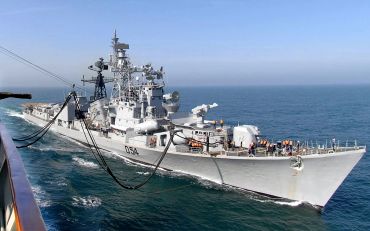
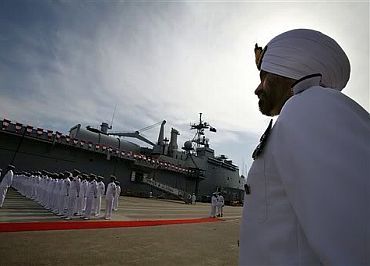
article